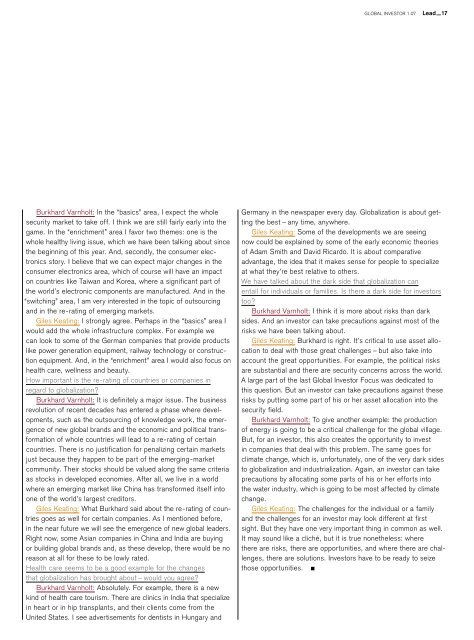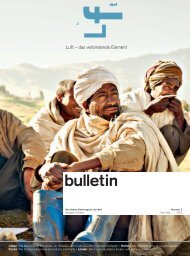Global families
Managing risks around cycles and supercycles Global Investor, 01/2007
Managing risks around cycles and supercycles
Global Investor, 01/2007
Create successful ePaper yourself
Turn your PDF publications into a flip-book with our unique Google optimized e-Paper software.
GLOBAL INVESTOR 1.07 Lead — 17<br />
Burkhard Varnholt: In the “basics” area, I expect the whole<br />
security market to take off. I think we are still fairly early into the<br />
game. In the “enrichment” area I favor two themes: one is the<br />
whole healthy living issue, which we have been talking about since<br />
the beginning of this year. And, secondly, the consumer electronics<br />
story. I believe that we can expect major changes in the<br />
consumer electronics area, which of course will have an impact<br />
on countries like Taiwan and Korea, where a significant part of<br />
the world’s electronic components are manufactured. And in the<br />
“switching” area, I am very interested in the topic of outsourcing<br />
and in the re-rating of emerging markets.<br />
Giles Keating: I strongly agree. Perhaps in the “basics” area I<br />
would add the whole infrastructure complex. For example we<br />
can look to some of the German companies that provide products<br />
like power generation equipment, railway technology or construction<br />
equipment. And, in the “enrichment” area I would also focus on<br />
health care, wellness and beauty.<br />
How important is the re-rating of countries or companies in<br />
regard to globalization?<br />
Burkhard Varnholt: It is definitely a major issue. The business<br />
revolution of recent decades has entered a phase where developments,<br />
such as the outsourcing of knowledge work, the emergence<br />
of new global brands and the economic and political transformation<br />
of whole countries will lead to a re-rating of certain<br />
countries. There is no justification for penalizing certain markets<br />
just because they happen to be part of the emerging-market<br />
community. Their stocks should be valued along the same criteria<br />
as stocks in developed economies. After all, we live in a world<br />
where an emerging market like China has transformed itself into<br />
one of the world’s largest creditors.<br />
Giles Keating: What Burkhard said about the re-rating of countries<br />
goes as well for certain companies. As I mentioned before,<br />
in the near future we will see the emergence of new global leaders.<br />
Right now, some Asian companies in China and India are buying<br />
or building global brands and, as these develop, there would be no<br />
reason at all for these to be lowly rated.<br />
Health care seems to be a good example for the changes<br />
that globalization has brought about – would you agree?<br />
Burkhard Varnholt: Absolutely. For example, there is a new<br />
kind of health care tourism. There are clinics in India that specialize<br />
in heart or in hip transplants, and their clients come from the<br />
United States. I see advertisements for dentists in Hungary and<br />
Germany in the newspaper every day. <strong>Global</strong>ization is about getting<br />
the best – any time, anywhere.<br />
Giles Keating: Some of the developments we are seeing<br />
now could be explained by some of the early economic theories<br />
of Adam Smith and David Ricardo. It is about comparative<br />
advantage, the idea that it makes sense for people to specialize<br />
at what they’re best relative to others.<br />
We have talked about the dark side that globalization can<br />
entail for individuals or <strong>families</strong>. Is there a dark side for investors<br />
too?<br />
Burkhard Varnholt: I think it is more about risks than dark<br />
sides. And an investor can take precautions against most of the<br />
risks we have been talking about.<br />
Giles Keating: Burkhard is right. It’s critical to use asset allocation<br />
to deal with those great challenges – but also take into<br />
account the great opportunities. For example, the political risks<br />
are substantial and there are security concerns across the world.<br />
A large part of the last <strong>Global</strong> Investor Focus was dedicated to<br />
this question. But an investor can take precautions against these<br />
risks by putting some part of his or her asset allocation into the<br />
security field.<br />
Burkhard Varnholt: To give another example: the production<br />
of energy is going to be a critical challenge for the global village.<br />
But, for an investor, this also creates the opportunity to invest<br />
in companies that deal with this problem. The same goes for<br />
climate change, which is, unfortunately, one of the very dark sides<br />
to globalization and industrialization. Again, an investor can take<br />
precautions by allocating some parts of his or her efforts into<br />
the water industry, which is going to be most affected by climate<br />
change.<br />
Giles Keating: The challenges for the individual or a family<br />
and the challenges for an investor may look different at first<br />
sight. But they have one very important thing in common as well.<br />
It may sound like a cliché, but it is true nonetheless: where<br />
there are risks, there are opportunities, and where there are challenges,<br />
there are solutions. Investors have to be ready to seize<br />
those opportunities.

















